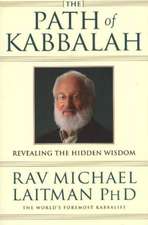The Origins of Organized Charity in Rabbinic Judaism
Autor Gregg E. Gardneren Limba Engleză Hardback – 3 iun 2015
Preț: 692.50 lei
Preț vechi: 778.08 lei
-11% Nou
Puncte Express: 1039
Preț estimativ în valută:
132.55€ • 144.03$ • 111.42£
132.55€ • 144.03$ • 111.42£
Carte tipărită la comandă
Livrare economică 21 aprilie-05 mai
Preluare comenzi: 021 569.72.76
Specificații
ISBN-13: 9781107095434
ISBN-10: 1107095433
Pagini: 252
Dimensiuni: 152 x 229 x 17 mm
Greutate: 0.48 kg
Editura: Cambridge University Press
Colecția Cambridge University Press
Locul publicării:New York, United States
ISBN-10: 1107095433
Pagini: 252
Dimensiuni: 152 x 229 x 17 mm
Greutate: 0.48 kg
Editura: Cambridge University Press
Colecția Cambridge University Press
Locul publicării:New York, United States
Cuprins
1. Introduction; 2. The poor and poverty in Roman Palestine; 3. From vessels to institutions; 4. Tamhui, the soup kitchen; 5. Quppa, the charity fund; 6. Charity with dignity; 7. The charity supervisor; 8. Conclusion: after the Tannaim.
Recenzii
'This book represents a very fine and fine-grained study of institutional charity in tannaitic literature. Its strengths are its intimate familiarity with the rabbinic primary texts and the secondary literature thereon, the clarity of its structure and argumentation, and its integration of archaeological evidence, Greco-Roman and Christian material, and modern theory. Besides providing a profoundly well-informed overview of the emergence of a set of institutions crucial for the development of Judaism and ultimately of the 'Judeo-Christian' and even 'Abrahamic' traditions, the book marks a genuine advance in our understanding of the historical context for the emergence of the tamhui and the quppa, the differences between these two institutions, and the differences between tannaitic and amoraic approaches to these institutions.' Tzvi Novick, University of Notre Dame, Indiana
'The Origins of Organized Charity in Rabbinic Judaism argues that the early rabbis, the Tannaim, developed a system of organized charity that, while in conversation with their contemporary world, is uniquely their own. Well-written and employing lucid prose, this groundbreaking book unfolds in a cogent, logical order. Gardner interacts with both classic and modern scholarship on rabbinic Judaism. This, of course, is to be expected. What is of most interest is his deft use of modern quotes and theory from other disciplines (anthropology, material culture, social history, and economics), which makes this volume much more usable beyond the audience of a specialist on rabbinic Judaism or ancient Mediterranean religions. This book will appeal both to specialists in any of these fields and to an educated general audience interested in the topic. It will also be suitable for courses on charity and economy in the ancient world or on various rabbinic topics.' Jordan D. Rosenblum, University of Wisconsin, Madison
'The Origins of Organized Charity in Rabbinic Judaism argues that the early rabbis, the Tannaim, developed a system of organized charity that, while in conversation with their contemporary world, is uniquely their own. Well-written and employing lucid prose, this groundbreaking book unfolds in a cogent, logical order. Gardner interacts with both classic and modern scholarship on rabbinic Judaism. This, of course, is to be expected. What is of most interest is his deft use of modern quotes and theory from other disciplines (anthropology, material culture, social history, and economics), which makes this volume much more usable beyond the audience of a specialist on rabbinic Judaism or ancient Mediterranean religions. This book will appeal both to specialists in any of these fields and to an educated general audience interested in the topic. It will also be suitable for courses on charity and economy in the ancient world or on various rabbinic topics.' Jordan D. Rosenblum, University of Wisconsin, Madison
Notă biografică
Descriere
This book examines the origins of communal and institutional almsgiving in rabbinic Judaism.
















